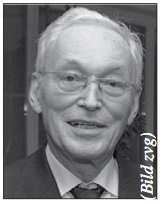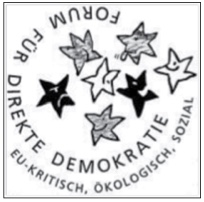Europe – federal-diverse, constitutional, democratic
Europe – federal-diverse, constitutional, democratic
The alternative to Macron’s “Appeal to the citizens of Europe”
by Professor Dr Heinrich Wohlmeyer
On 5 March the Viennese daily newspaper “Die Presse” published Emmanuel Macron’s “Appeal to the Europeans” without comment, almost as a good guideline for the European elections. A single letter to the editor was critical of the proposal for a “European Agency for the Protection of Democracy”.
A broader critical consideration seems to be necessary.
Macron does not touch financial order
For now: Macron’s letter to the Europeans and his request for the support of the European governments seems to be a help seeking “escape to Europe”, because internal problems are catching up with him (see Yellow Vests).
For the second: Macron’s letter to the Europeans and his request for support from the European governments seems to be a “flight to Europe”, because the internal problems are catching up with him (see Yellow Vests).
For the second: Macron does not touch in any sentence the international financial order of which he himself is a child. But this, together with the current trade policy, is one of the driving forces behind the increasing impoverishment of large sections of the population (loss of jobs, good wages and adequate pensions). Although he apostrophises the “crises of financial capitalism”, he does not question the system to which he owes his rise.
Not a word about direct democracy
But now to the arguments and proposals:
Its central objective is “to reinvent, in political and cultural terms, the shaping of our civilisation in a changing world”. The pivotal points are “freedom, protection and progress”. In doing so, he seeks to respond to the concerns and fears of citizens. But he does not say a thing about direct democracy in order to give a voice to the concerned citizens.
One could cynically ask: “Progress where to go?” (en marche ...), protection from what? (From Russia, whose military budget is only slightly more than a fifth of that of the European NATO states and which is not willing to attack?) Freedom through the installation of a political control authority called “Agency for the Protection of Democracy”? The latter is more like a dictatorship opinion in the guise of political correctness.
France is not a peace power
The international claim to power is being raised vigorously (“no second-rate power” – “Europe as a whole plays a pioneering role”), and for this we must arm ourselves “in harmony with NATO”. At the same time, however, the “unique project for peace” is invoked. In this context, those who have a little knowledge of recent history ask themselves why France is still using the Foreign Legion as an intervention force abroad and why it is still using it for the various regime changes in francophone Africa? Why is France maintaining a costly nuclear bomb programme? Why does it continue to keep the poorly managed overseas territories from the colonial era? And why did it intervene in Libya and Syria, for which we are all paying? Isn’t this an inappropriate craving for status?
The perspective for Europe looks different
Shouldn’t we Europeans finally realise that only 6.3% of the world’s population live in the EU (4.5% in the euro zone)?
In a realistic way, we can play a role in the world similar to that of the ancient Greeks in the Roman Empire, and even in the loss of political power, we can play a most valued role in thought and culture (remember that the Gospels were originally written in Greek … and the Hadrian’s Library in Athens …).
The goal cannot be a mishmash, but diversity and its delightful beauty. A diverse “Europe of the Fatherlands”, as Charles de Gaulle called it, should be our ideal.
Where is the infectious vision of a Europe that inspires young people, that builds on its Christian-Greek-Jewish-Latin roots, that is proud of its philosophers and state teachers, its polyphonic music, its poets, its scientists and technicians, and that is a model for the whole world in its constitutional-democratic shaping of society? Where is the vision of a Europe that offers Heimat and identification, because it is supported by a common culture that shows unity in diversity (in necessariis unitas, in dubiis libertas, in omnibus caritas – in need unity, in doubt freedom, but in all love)?
The economic treaty – and euro-corset
According to the usual political mainstream, Macron puts the three freedoms (persons, goods, capital) to one side over the diversity of Europe, but the legal every day life of the citizens giving them a home (up to common land register and inheritance rules) is not affected. Instead, additional legal systems are imposed in the form of “comprehensive” international economic treaties and endowed with jurisdiction.
In addition, there is “the euro, which makes the entire EU strong”. The reality, however, is rather that the corset of the euro leads to the compulsion of “internal devaluation” instead of the possibility of external devaluation (exchange rate). With their own currency, competitive disadvantages (including those based on a “looser lifestyle”) could be largely offset. Now wages and salaries, social benefits and other government expenditure have to be paid. Greece and the Yellow Vests send their greetings. In addition, the ECB’s quantitative easing (over 4 trillion euro to date) and the practically unlimited guarantees under the EFSM and ESM have so far been swept away.
The passage “projects that have changed the image of our regions” is particularly suggestive. The deserted peripheral areas, where the Yellow Vests stood up in particular, are a warning (saving decentralised infrastructures, although the social future must be based on decentralisation and intelligent networking in energy policy, ecological, social and economic terms).
As is well known, Macron sees a further “strengthening” in a banking union and a European unemployment insurance system, which amounts to a request for cash from the well-off states.
EU Treaty provides democracy tradition upside down
The “Constitution” of the EU (Treaty on European Union and Treaty on the Functioning of the European Union) turns the European legal and democratic tradition upside down. Because legislation is based on the executive power assembled, Parliament only has the right to slow down through its intervention, and the Commission can use the politically composed Court of Justice to undermine resistance. Macron takes all this to heart and is surprised when citizens stand up against this game of elites at their expense. These citizens are being accused by him of “falsehood and irresponsibility” because they are endangering the “European project”.
The demands made to reassure the citizens for a pan-European basic social security system, equal wages and a minimum wage require trade and financial security, but these are ignored by him. Without them, it is probably just tranquillising pills.
Alternatives are already being considered
I therefore wanted to send my “Outlook Manifesto” translated into eight languages to President Macron. Communication is officially controlled by his wife. This may also be one of the reasons why Macron’s policy is so over the top.
I have titled one of the last chapters of my book “Outrage in Europe – Ways out of the Crisis” (Ibera University Press, Vienna 2014): “Standing up for a Europe as ‘Light for the World’ – federal-diverse, constitutional, democratic, tolerant, solidary and educated, and above all respecting the dignity of the person and realising the human rights”.
The prerequisite for this is not only the detachment from old claims to power, but above all the restructuring of the current financial and trade order – even against the resistance of the only hegemon USA – to secure the economic basis of this vision. The latter will be difficult for Emmanuel Macron since it would go directly against the interests of his promoters (doers). •
(Translation Current Concerns)


Heinrich Wohlmeyer was born in St. Pölten, Lower Austria, in 1936. He studied in Vienna, London and the US. He is an Austrian industrial and research manager as well as a regional developer and was active in industrial and regional development for over 20 years. He was one of the first to initiate sustainable concepts and created the Austrian Union of Agricultural and Nutritional Scientific Research and the Austrian Society for Biotechnology. Heinrich Wohlmeyer taught at the Technical University in Vienna and at the University of Natural Resources and Life Sciences in Vienna. He initiated the Austrian legislation for balancing expenditure and is the author of countless trade articles, among which focus on CETA-, TISA-, and TTIP- agreements. Today Wohlmeyer operates a mountain farm in Lilienfeld (Austria). Wohlmeyer is married, has three daughters and five grandchildren. His books include: The WTO, Agriculture and Sustainable Development (2002); “Globales Schafe Scheren – Gegen die Politik des Niedergangs” (2006) (Global Sheep Shearing – Against the Politics of Defeat); “Empörung in Europa – Wege aus der Krise” (2012) (Outrage in Europe – Ways out of the Crisis).
Resolution of the “Forum for Direct Democracy“ to discuss the Framework Agreement with the EU


The “Forum for Direct Democracy“ welcomes the fact that, for the first time in many years, numerous important voices of the left critically question EU policies. For too long, EU criticism has been left to the political right, especially the SVP (Swiss Peoples Party).
The “Forum for Direct Democracy“ supports all efforts to establish long-term, regulated relations with the EU. However, agreements must be within the framework of international law. As a non-EU member, Switzerland cannot subject itself to Union law; the “Forum for Direct Democracy“ rejects any compulsion to adopt EU law automatically or recently called “dynamically“. Any adoption of EU law must, as before, continue to be decided by the responsible Swiss authority, including a possible referendum.
A future framework agreement must make dumping of wages and eco-dumping impossible. In this respect, the present draft treaty leaves many questions unanswered, as far as is known at all. How is protection of wages monitored, what ecological requirements are still permissible in the working awards and procurement contracts, e.g. to reduce truck journeys?
Another very important concern for the “Forum for Direct Democracy” is that Switzerland should not be involved in the rapidly advancing militarisation of the EU. The Swiss army must not in any way become part of a future European army or intervention force. This would make both the continuation of the current policy of neutrality and a more active peace policy in the future impossible at a time when the arms race of the major powers is escalating.
Unanimously adopted at the annual general meeting on 2 March 2019 in Berne
“Forum for Direct Democracy”
Paul Ruppen Luzius Theiler
President Member of the Board
The “Forum for Direct Democracy“, founded in 1992 to combat accession to the EEA, organises the ecologically, democratically and socially arguing EU critics in Switzerland. The Forum publishes the EUROPA-MAGAZIN, which twice a year publishes highly esteemed background information on developments in the EU, on the worldwide spread of direct democracy and on the situation of fundamental and human rights.
Contact: +41 79 647 36 69/+41 31 731 29 14
www.europamagazin.ch